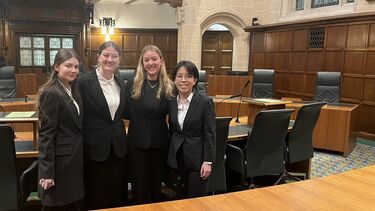Each academic year, the University of 91ÖąēĨ participates in the Michael Corkery QC Criminal Law Moot Competition. In October, students from the School of Law are invited to apply for the external mooting team of the student-run Edward Bramley Law Society. The Society, in coordination with the Employability and Enrichment Activities team of the School of Law, facilitates student involvement in various external mooting competitions, and applicants are encouraged to indicate their preferences. I submitted my application and expressed a particular interest in this moot. I was delighted to be selected, along with Amelia Gaughan.
The prestigious criminal mooting competition run by 5 Paper Buildings is comprised of two knock-out rounds, followed by the final. Each team has two students, who are currently in their final year of a law degree or are BTC students. For each round of the competition, the moot problem was released three weeks in advance, with the bundle to be submitted one week in advance. The opposing sideâs bundle was made available three days before each moot.
Round 1
The first round of the competition was held in person at Middle Temple in London at the end of November. The moot problem concerned an appeal against a rape conviction. We represented the appellant in this round. The first ground dealt with the conclusive presumptions in s.76 Sexual Offences Act 2003, the second ground concerned the admissibility of a complainantâs previous sexual history as criminal evidence under s.41 of the Youth Justice and Criminal Evidence Act 1999.
At the end of the day, it was announced that out of the approximately 28 teams in attendance, 91ÖąēĨ were successful in progressing to the second round.
Round 2
The second round was held online at end of January. The moot problem concerned an appeal against a joint enterprise murder conviction; this time we were representing the respondent (the crown). The first ground dealt with whether the conviction was safe under the revised law of Jogee. The second ground dealt with whether exceptional leave to appeal out of time should be granted for the appellant. We were pleased to progress to the final alongside the University of Cambridge.
Round 3
The final took place in the Supreme Court with members of chambers and invited friends and family in attendance.
The final round concerned a human trafficking case, where we represented the respondent Mr Nguyen. The first ground specifically questioned if the abuse of process jurisdiction remained available in the context of the introduction of the s.45 defence (Modern Slavery Act 2015). The second ground questioned if the principle of finality applied where the appellant had been properly advised and had not sought to make an application to stay the proceedings.
The final was judged by esteemed members of chambers and the judiciary, including Lord Justice Tim Holroyde, His Honour Judge Andrew Johnson and Robert OâSullivan KC, head of chambers at 5PB.
The final itself brought a different style of judicial intervention; the types of questions that were asked were not what we had anticipated. This reinforced some advice we were given during an advocacy workshop at the first round, which was that court of appeal judgeâs interventions are near impossible to anticipate. After deliberation, the judges revealed the two winners of the competition to be myself and a student from Cambridge.
To those who might be interested in mooting, I cannot recommend this competition enough. The competition improved my ability to think on my feet in response to judicial intervention, it also introduced me to areas of criminal law I had not studied before. The barristers and judges involved in the competition were able to provide useful feedback on our advocacy and provide advice regarding a career at the criminal bar as well as pupillage applications.
Angelina Freeman
MA Law student
School of Law, University of 91ÖąēĨ

